Throughout the election, I haven’t been a big fan of polls, mainly because numbers aren’t always what people think they are or want them to be. Perhaps the only poll that I relished was a GOP sponsored poll from Right Insight that went out via mobile, which was so messed up no-one who received it could respond properly. I was delighted that the Utah Republican Party had spent so much money that was botched from poor programming, a failure to test, and an incredibly bad rollout.
On the other hand, election results are the real data we campaign to see. Election night results will post on Tuesday. I may lose, but I revel in the progress we made in this district. The fight isn’t over, not by a long shot.
What We Face
House District 44 is decidedly a very red district. With 52% of registered voters listed as Republicans, it’s daunting to think that a rival candidate could run successfully here and have a significant impact on the “safe seat” for the GOP that was carved out in 2020.
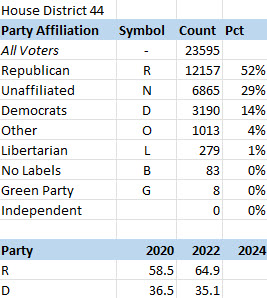
Sizing Up The Opponent
When Teuscher first ran for office in 2020 it was a Presidential election year and there was the COVID-19 pandemic. He ran in Utah House District 42 before the redistricting took place, and when Utah was experiencing the COVID-19 pandemic. In the second election in 2022, it was a mid-term election cycle with lower voter turnout in a newly defined Utah House District 44. The last election had also produced an odd strategy for voters outside the Republican party to register as Republicans in order to affect the closed primary of the Utah GOP. The idea had been to successfully promote more moderate candidates during the GOP primary to give better options for all voters in the general election. This also had the unwanted effect of bolstering the number of voters registered in the Republican party. Suffice to say, these two past elections would not provide substantial data for me to work with as a comparative example to build from. There was good data showing that Unaffiliated voters tended to lean Democratic though, and the influx of new voters in Daybreak community was appearing to make our District more purple than it had been.
There were (and still are) significant issues with the bills introduced by Teuscher since he has been in office. You can see his voting history in the Alliance for a Better Utah annual progress report, which grades politicians against comparable positions for Good Government, Equal Rights, Sustainable Future and Strong Communities. Teuscher received an “F” in 2024, 2023 and 2021; and a “D” in 2022. Teuscher votes against public education, is a primary sponsor of anti-union legislation targeting Utah public employees, and sponsors bills that weaken Utah voter rights. He is a source of bills from copy/paste legislation promoted by conservative right think tanks (when a particular legislative issue is trending across states, there is a good chance that Teuscher’s name is attached to the Utah version of the bill). Anyone who isn’t completely indoctrinated in Fox News rhetoric recognizes that he does not represent local issues or engage voters.
I decided to register as a candidate when the Salt Lake County Democratic Party had found no-one who was willing to run in our House District. It was January 4 (the night before candidate registration closed) that I made the decision, and I said then that if I registered I would not run as a “name-only” candidate; I would invest myself to run in earnest and fight for the seat. I was a first-time candidate, running as a Democrat in a primarily Republican district against an incumbent. I knew enough to know that I didn’t know what I was about to get into.
I knew that there were key issues for me to run on. Teuscher’s anti-union rhetoric, and his clear stance on de-funding public education were clear problems. I personally was upset at his regular comments about getting rid of students with learning disabilities because I happen to be a Special Olympics dad and proud parent of a kid with an Intellectual or Developmental Delay (IDD) who had successfully navigated through Jordan District public schools. I’m incensed by his willingness to lie in the face of constituents about the intent and impact of his bills, and his anecdotal stories that obscure data and real public sentiment.
I Was Told I Wouldn’t Win
In politics, it’s often a numbers game before the impact of issues, political climate or social sentiment are considered. In the early months of my candidacy I was told by a party officer who will remain un-named that I wouldn’t win, and should consider a smaller race in the future. Important races were selected not based on issues where we had to win, but on what districts were considered “flippable”. Essentially, they weren’t focusing on our message to voters, but put emphasis on these statistical outcomes. The difference here is in what you consider the return on interest (ROI) of the campaign. Did you win a seat? Did you help an upstream/downstream candidate? Did you affect a topic in a positive way? Did you recruit voters? Did you grow alignment to the party? In election races, the focus this year was on winnable seats, and mine was not one of them. It was a numbers game, defense of principals be damned. From the perspective of the county and state Democratic party, mine was purely a supporting role as they focused on other races.
I was slotted into the strategy of “contest every race” that sought candidates (often name-only) to run against opponents in every district, so that voters could feel like a choice was present – even if it was admittedly a false choice. I will die on the hill that candidates who register to run should be qualified, align to the democratic platform, actively campaign, and be supported. Elections are not a raffle, they are fought and won. If I was going to put my name in an election hat, then I would run a campaign. I was not going to sit by.
Endorsements and Fence Sitters
An important aspect of campaigns is the seeking of endorsements, which can be helpful in a number of ways. Endorsements can be visible. They can be financial or for in-kind support. They can be hands-on with the supply of volunteers to help during events and canvasing. Endorsements can even provide access to mentoring or education on topics. In most cases, an endorsement of any kind helps greatly. The lack of an endorsement can equally be to the detriment of the campaign. What bothers me about these groups is that they expect candidates who sought endorsement to infer future support for their cause when they choose to do nothing. As in any relationship, it becomes more guarded and tentative when you realize they don’t have your back.
I was disappointed by organizations that chose not to endorse me in order to hedge bets so that they could preserve future working relationships, but I understood the need for diplomatic decisions. Politics is politics. There were some organizations that made decisions with no transparency or feedback, and some that seemingly worked against their own best interests when endorsing candidates. In one example, an organization had sent out exactly one letter to its members in the election year, advocating against a piece of legislation that had been sponsored by the person they then later endorsed. And there were organizations that sought to extend requirements for endorsement by writing affirmations that extended beyond their platform or caucus, like a labor union that wanted unfettered 2nd amendment guarantees before they would endorse (I was not endorsed by that particular union).
What is important was that I was able to secure key endorsements from Labor, from Education, from Issue and Identity Caucuses, and for Freedom of Religion. These mattered greatly to me because the message from these backings was that the people in these groups were being disenfranchised, and wanted better representation. Teuscher was hosting or voting for bills that take away personal rights, that de-fund public education, that dismantle workers rights. Coming together to fight him for the legislative seat was appropriate and timely.
Monumental Screw Ups for Teuscher and the Utah GOP
There were several big events that took place over the summer where I gained advantage. The Utah legislature’s over-reach was finally getting checked by the Utah Supreme Court in four ongoing cases. The Utah GOP was making their clear over-reach visible, and were getting tied down in expensive legal battles that Utahns were footing the bill for.
1) Utah Supreme Court decision on LWV Utah vs Utah State Legislature
In July of this year, the Utah Supreme Court passed by unanimous decision to allow the League of Women Voters Utah to proceed with their claim that SB200 violated Utahns’ state constitutional right to alter and reform their government. The court remanded the case back to the trial court where it will be decided. This was a major victory for Utahns, and the Republican legislature immediately lamented the decision, including Jordan Teuscher.
2) Injunction on Utah Trigger Law Upheld
In August this year, the Utah Supreme Court rejected Utah’s request to overturn the preliminary injunction blocking SB174, the state’s abortion trigger ban, from taking effect. Again the Republican legislature blasted the “liberal Utah Courts” for having the audacity to check them (remember checks and balances)? Jordan Teuscher even wrote a note about it.
3) Citizen Ballot Initiatives
Yet another Utah Supreme Court decision, this time to allow the case against the Utah Legislature’s willful disregard of the people’s voice for new district maps. The gerrymandering case is allowed to proceed at a lower court.
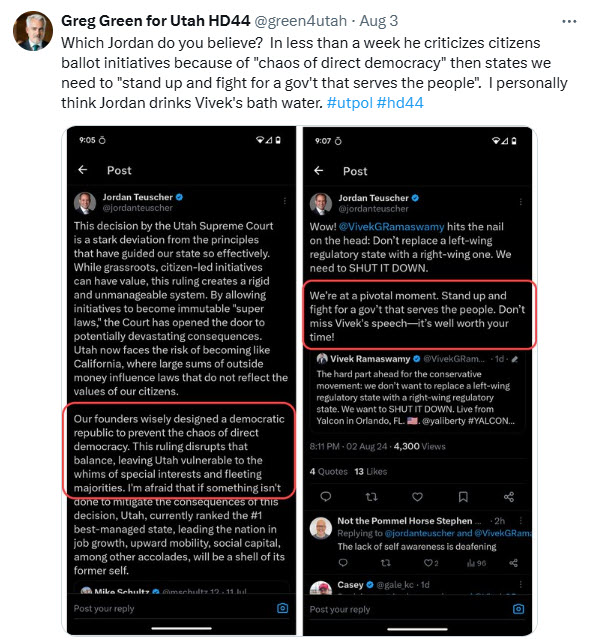
4) NetChoice Wins, Do You See The Pattern?
In September, the courts blocked Teuscher’s Minor Protection in Social Media Act with a preliminary injunction for violating first amendment rights. The plaintiffs gained significant ground in the case when the judge confirmed that the Utah law breached constitutional rights.
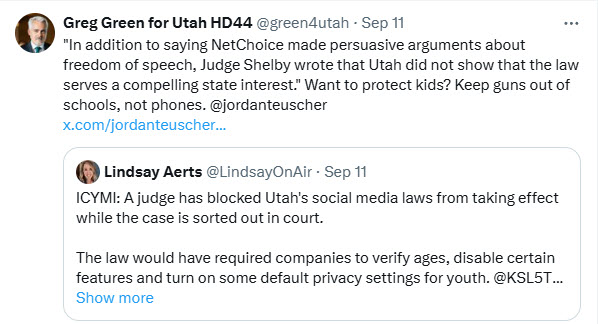
The “Emergency” that Wasn’t: How Amendment D Shaped Up
It was during the Democratic National Convention in August that the Republicans decided to call an emergency legislative session to address the applied checks to their unbalance. The “emergency” was a ploy to bring Republican legislators together to craft a new ballot initiative that, if approved, would change the Utah Constitution and strip voter rights away from Utah constituents. Their problem was that to make this change, they needed voters to approve a constitutional amendment. Jordan Teuscher was the house sponsor of SJR401, which became Amendment D to strip Utah voters of legislative rights (This was blocked by Utah Courts on Sep 12, 2024 for deceptive language, and for not following due process). Teuscher was also the House floor sponsor of SB4002 ‘Ballot Proposition Amendments’ to jam through Amendment D, which was voided on ballots.
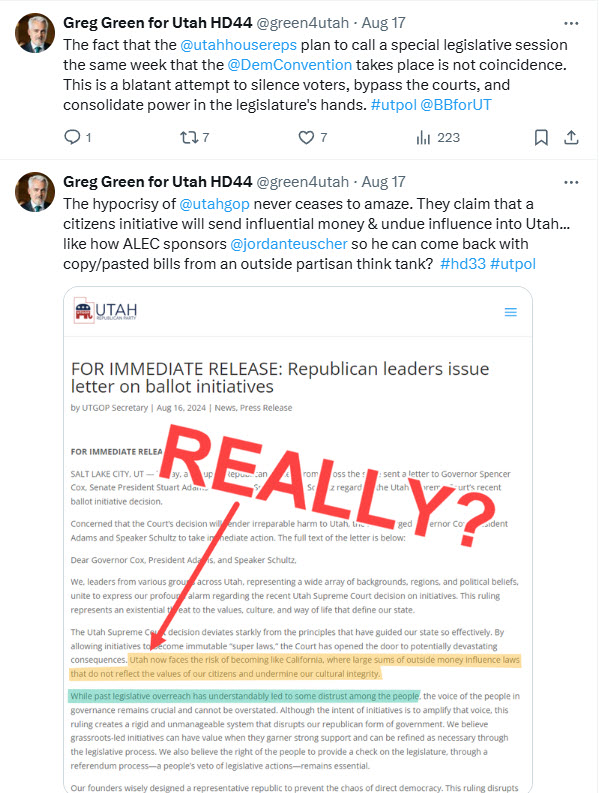
Ballots were printed before the Supreme Court decision that voided Amendment D took place, and the deceptive language of the ballot question became a public issue. The question implied foreign interference was a problem (it wasn’t, and never has been). The question failed to clearly state that the bill removed voter rights, and granted the legislature authority to override successful ballot initiatives passed by Utah voters. It was an outright sham.
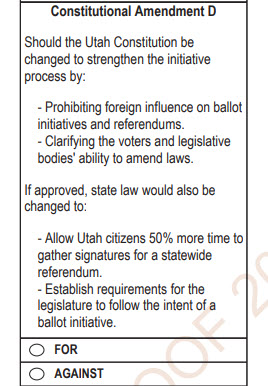
Of course, Teuscher went online to defend the Amendment he was sponsoring. I broke the video down to call out the disinformation presented by Jordan and the Utah GOP.
Seeing Red? Vote Green
Jordan Teuscher is our representative, but he’s failing to serve constituents here. He is backing seriously flawed bills that end up in court. He’s an acolyte of the right wing and is a primary sponsor of the kind of cut and paste bill language from “foreign interests” that he accuses other parties as doing (every accusation is a confession). He doesn’t represent our values, he doesn’t serve our community, or the interests of Utah voters. My job has turned into asking you to vote for what’s best for you, what’s best for our district, and what’s best for Utah by helping me unseat Jordan Teuscher this election. I want to drop the rhetoric and focus on what’s best for Utahns. If you want to see my proposed 2025 legislation, take a look at https://utah44.com/proposed-2025-legislation/.
What’s Next? Stay Engaged
We are winning battles, but the fight isn’t over.
- Support groups like Alliance for a Better Utah, Better Boundaries, ACLU Utah, League of Women Voters in Utah, Utah Education Association, and Planned Parenthood of Utah for the fights that they are bringing to the courts on our behalf.
- Get involved – to be anything other than a Republican in Utah means that you have to be active, and you have to make your voice heard. We need individuals who are dedicated, who can engage their party, become delegates, train to become candidates, and are committed to running in future elections. This has to start NOW to be qualified and ready.
- Engage with active bills – you can follow legislation at https://le.utah.gov/bills/bills_By_Session.jsp. Learn who your legislators are, how to engage them, and how to testify when bills are being debated on the floor.
None of this is easy, but it matters greatly to be involved and to be part of positive change. If we don’t fight to defend our rights, and if we don’t actively engage, then we give ground.
No Retreat, No Surrender.
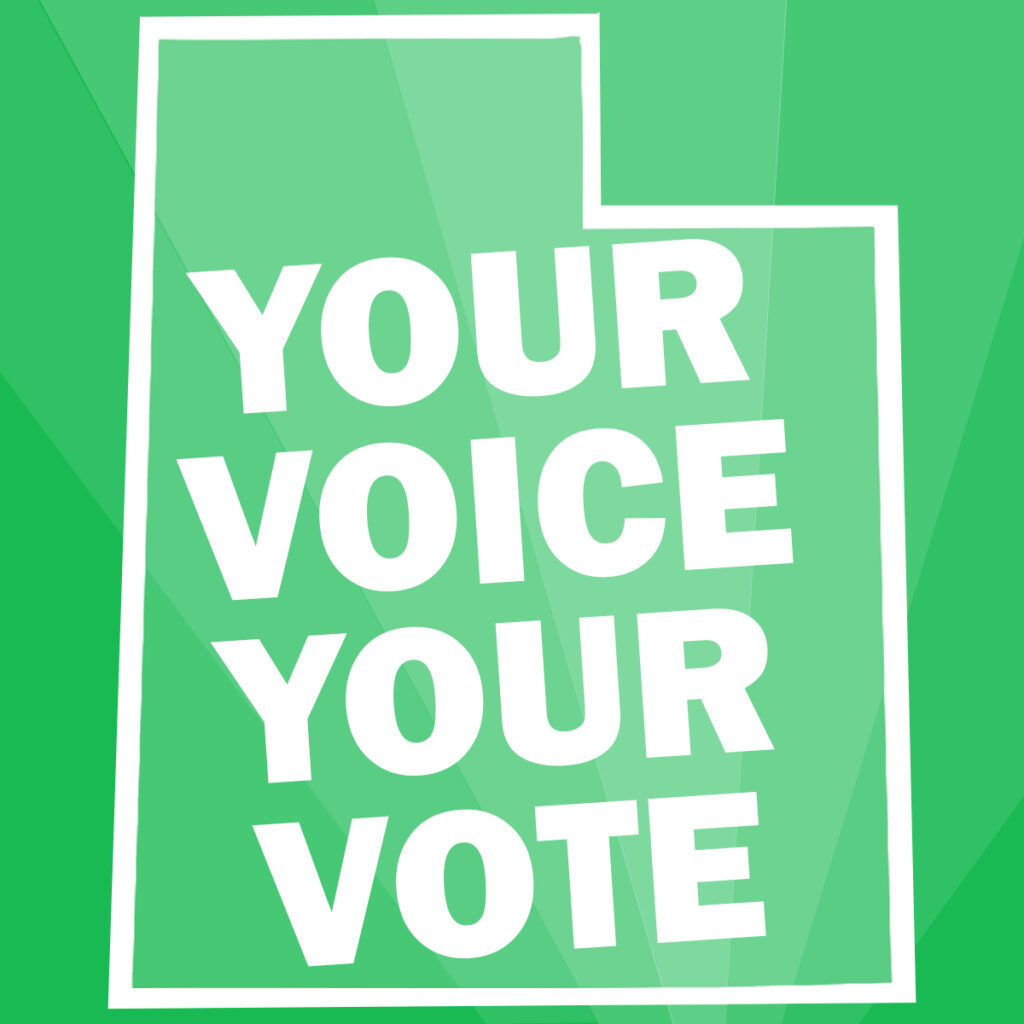
Discover more from Utah House District 44
Subscribe to get the latest posts sent to your email.
